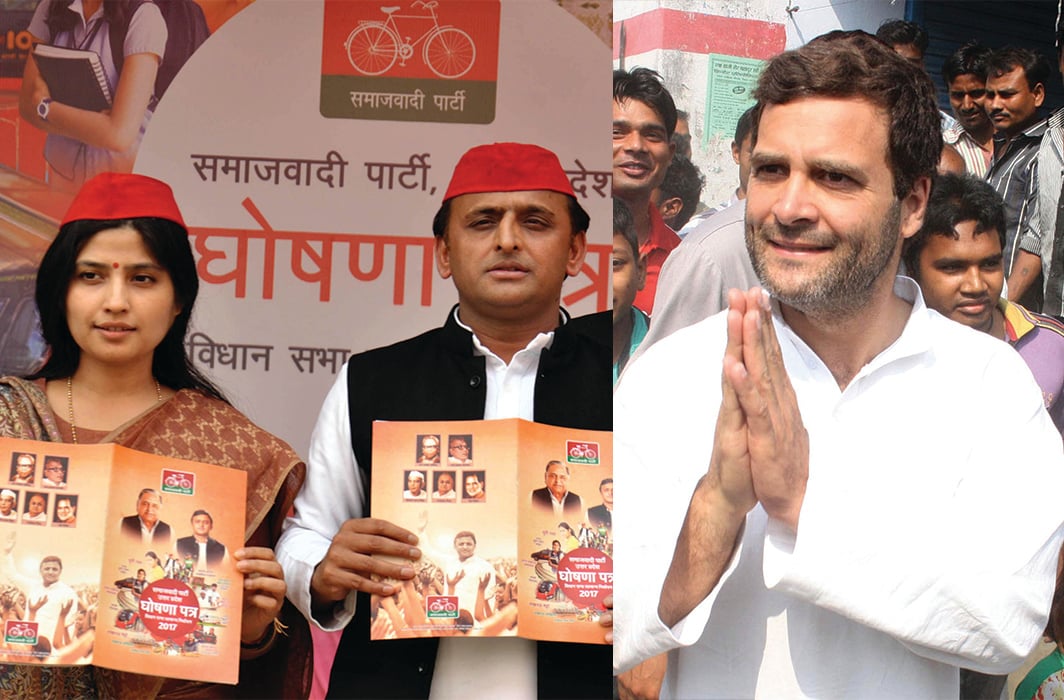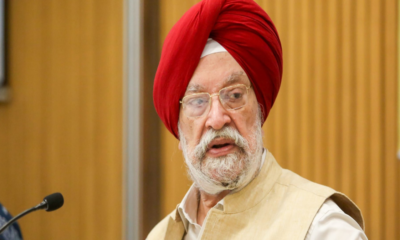There is visible desperation in Akhilesh Yadav reaching out to Congress
Parsa Venkateshwar Rao Jr
Tactics are very important, and battles need to be won if the war is to be won. Seen from this point of view, the Samajwadi Party (SP) led by Akhilesh Yadav, the Gen-Next leader of the party and the Congress, unofficially led by Nehru-Gandhi Gen-Next, Rahul Gandhi and Priyanka Vadra, agreeing to be poll partners in the February-March assembly elections in Uttar Pradesh sounds practical and pragmatic. The SP under patriarch Mulayam Singh Yadav has been an eminently anti-Congress party, which was seen as the face of upper caste domination in the caste-riven state. But times change, and so do generations. It is legitimate for both SP and Congress to reboot their agendas as it were, and to find commonalities in place of the earlier divergences and opposition.
It is possible that Akhilesh Yadav and Rahul Gandhi/Priyanka Vadra may want to sit and rethink their priorities, and bring about a political alliance between the Yadav-dominant Other Backward Class/Caste (OBC) SP and the so-called upper caste/upper crust base of the Congress. Of course, the two sides are in fact looking to the nearly 19 per cent Muslim vote, which goes under the neutral term of “minorities”. The other major group in the state’s hierarchical social/caste stratification is that of Dalits, who form a solid bloc under the Bahujan Samaj Party (BSP) led by Mayawati.
The SP, the BSP and the Congress, as well as the Bharatiya Janata Party (BJP), adopt the politically correct stance that they do not recognize caste divisions, and that they appeal to all social segments, that is caste segments. That is why, BSP gives enough seats to Muslims and Brahmins, and the SP gives a nod to Dalit presence. The Congress is looking to the Dalits and the Muslims, apart from the upper castes led by Brahmins and Rajputs. The BJP pretends as though Muslims do not exist while it tries to woo the Dalits, the Most Backward Classes/Castes (MBCs) and the upper castes. The caste combinations in the political calculus of each party make for a nice psychedelic graphic mix.
It looks like that the SP-Congress alliance with its eye on capturing the Muslim vote would push the BJP to try for the consolidation of the so-called Hindus, cutting across caste— upper, middle, backward, oppressed—lines, making it into a Hindu-Muslim divide. But the BJP will be hard put to enthuse the different segments of the Hindu society as one because the idea of Ram temple in Ayodhya does not enthuse the majority community. The BJP under Prime Minister Narendra Modi wants to shed its “brahminical” cultural affiliation and reach out to other caste groups, willing to risk losing its upper caste base. It was the BJP tidal wave that swept all before it in the 2014 Lok Sabha elections, and it seems to have traumatised the SP and the Congress, if not the BSP.
But the best laid plans of all the parties might go awry. Brahmins may not go with the BJP, BSP or the Congress. But it cannot be the case. They have to choose one among the three. The Brahmins can hope to be part of the power structure in a SP-Congress alliance, and the Dalits too can base their choice by voting for the alliance. Similarly, Muslims will have to choose from among the SP, BSP and the Congress. Psephologists and political realists describe these choices under the rubric of “tactical voting”.
Idealists are sure to be saddened by the caste battle lines and would be asking whether Uttar Pradesh can break out of the caste crucible. The truth might be that a significant number of people, especially the youth, might be opting out of the caste mould and voting for parties and candidates who lie beyond. It appears that something of this kind might have happened in the state during the 2014 Lok Sabha elections, when quite a large number of people did not vote along caste lines and therefore voted with an open mind, willing to give the BJP under Modi to govern at the centre. Will they be willing to do the same in an assembly election which means changing power equations nearer home?
The SP and the Congress would want to pre-empt the out-of-the-(caste)-box voting choice of the Muslims especially. But it would seem that the Muslim youth have a mind of their own, and they are not willing to vote on the jaded issue of secularism vs communalism. Their demands are different, and it is for economic opportunity. If they refuse to vote for Modi and the BJP, it will not be because they consider Modi/BJP to be anti-Muslim, but they would judge them on their failure to deliver on the economic promises. The Dalits are unlikely to abandon the BSP/Mayawati banner because they know that victory is politically feasible with the right caste, and not political, alliances.
Lead picture: It looks like that the SP-Congress alliance, with its eye on capturing the Muslim vote, would push the BJP to try for the consolidation of the so-called Hindus cutting across caste, making it into a Hindu-Muslim divide. Photos: UNI


 India News13 hours ago
India News13 hours ago
 India News12 hours ago
India News12 hours ago
 India News3 hours ago
India News3 hours ago
 Cricket news3 hours ago
Cricket news3 hours ago
 India News2 hours ago
India News2 hours ago













